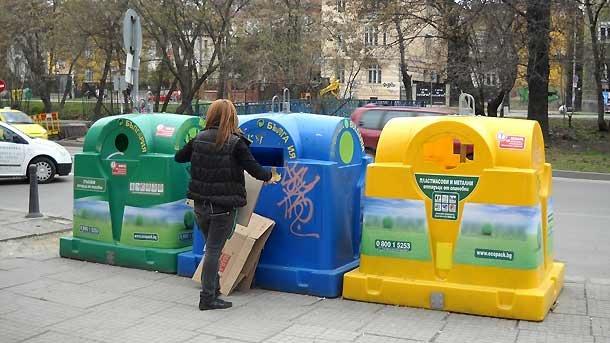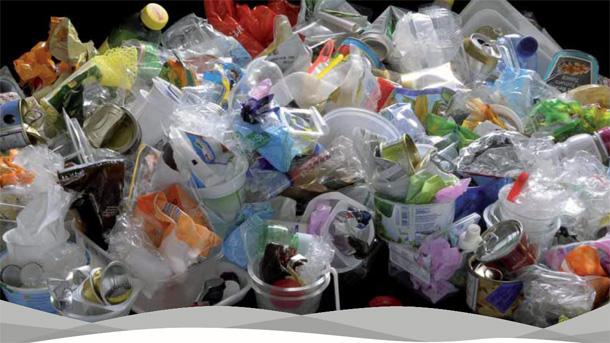Separate waste collection is only a recent practice for Bulgaria. Its large-scale implementation started with the adoption of the Waste Management Act back in 2003. It pays special attention to wrap waste that takes the greatest share of the overall volume of waste across the globe. An eco-tax was introduced for all the producers and traders of packaged products. There is another opportunity – those to be freed of this fee, if they unite in enterprises for utilizing the wrap waste. Such associations have been created and those have implemented the Separate waste collection bins in different neighborhoods. The Ekopak Company comes as a result of the oldest unification of producers, aimed at the usage of wrappings thrown away. Today it holds 43 percent of this market and provides 50 percent of waste paper and plastics in this country.
 However, there is a curious detail, causing concern: barely 15 – 20 percent of the waste, collected by these enterprises comes from city neighborhoods and the rest is collected directly from commercial and producing companies. Separate waste collection is stalled, as far as neighborhoods are concerned, one of the former deputy ministers of environment admitted a year ago. What are the reasons? We can see one of them early in the morning – an army of hobos takes out of the separate waste bins anything more valuable, in order to sell it to scrap centers. “Then we go there to buy back the waste, thrown in our containers and then stolen!” says CEO of Ekopak Todor Burgudjiev resentfully.
However, there is a curious detail, causing concern: barely 15 – 20 percent of the waste, collected by these enterprises comes from city neighborhoods and the rest is collected directly from commercial and producing companies. Separate waste collection is stalled, as far as neighborhoods are concerned, one of the former deputy ministers of environment admitted a year ago. What are the reasons? We can see one of them early in the morning – an army of hobos takes out of the separate waste bins anything more valuable, in order to sell it to scrap centers. “Then we go there to buy back the waste, thrown in our containers and then stolen!” says CEO of Ekopak Todor Burgudjiev resentfully.
“The new igloo-type containers with a small aperture are considered to be more protected, but the hobos found a way to break through those as well. They open the lower part, take out whatever they need and then close the contained back,” Mr. Burgundjiev explains.
One of the solutions of the problem is the law to be complied with and all waste depots to be taken out into the industrial zones in the suburbs. Only firms should be allowed to deliver stuff there with the proper documentation of origin. However, there is still resistance against the implementation of this article. In the meantime hobos and underground bosses standing behind them are monitoring closely the situation on the market. Plastic waste has been recently collected first, as its price is 30 percent up:
 “A new waste recycling plant has been recently opened in the town of Pleven and demand is on the rise,” the expert explains. “The Romanian market has also opened for us and they have 6 big recycling enterprises.”
“A new waste recycling plant has been recently opened in the town of Pleven and demand is on the rise,” the expert explains. “The Romanian market has also opened for us and they have 6 big recycling enterprises.”
Stimuli are necessary to the citizens, in order for the separate waste collection system to be improved. The current one for calculating the waste fee according to the tax assessment of the property is unfair, business representatives claim.
“Fairer payment should be introduced, according to the amount of waste, thrown away by a household and not according to the area of the apartment,” Mr. Burgundjiev goes on to say. “One should also pay less, if throwing the garbage in a separate way. The municipalities are interested in that aspect too, as they will be obliged to reduce progressively the waste, reaching the depots.”
However, at first the fairer system will mean higher fees for citizens, as the waste tax paid by companies at the moment practically subsidizes the garbage tax citizens pay, which is unrealistically low, experts claim. The reaching of a balance between both fees however cannot be expected before the local elections next year, as not a single mayor would dare do it, if he wants another term, vicious practice shows.
English version: Zhivko Stanchev
The Bulgarian minority in Romania marked a significant event with the official opening of the Bulgarian Inn in the village of Izvoarele (Hanul Bilgarilor), Teleorman County (Southern Romania)- a locality with Bulgarian roots dating back over 200 years...
The 14th edition of DiVino.Taste, Bulgaria’s leading forum for wines and winemakers, will take place from 28 to 30 November at the Inter Expo Centre in Sofia. Over 80 producers from all wine regions will participate, offering tastings of around 600 of the..
Minutes before the second and final reading, at the parliamentary budget and finance committee, of the state budget for 2026, the leader of the biggest party represented in parliament GERB Boyko Borissov halted the procedure and sent the draft bill..

+359 2 9336 661
